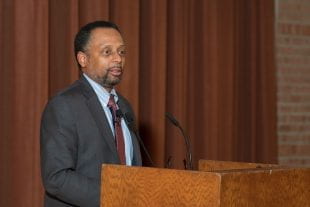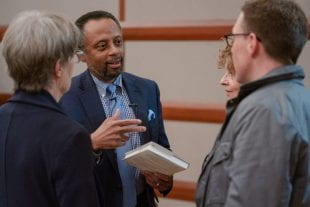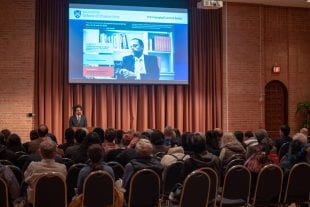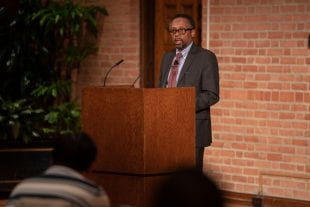Social historian Earl Lewis calls for a more holistic and humanistic education at Campbell Lecture Series
The world-famous flop of Fordlândia, Henry Ford’s 1928 venture into the Amazon rainforest, was not only a failure of logistics, but also a failure to consider the human factors involved in building a prefabricated industrial town meant for 10,000 people in a massive jungle. And then there’s the less-known story of the West African water pump that was plopped right in the middle of a village by well-meaning engineers looking to deliver clean water.

Author, social historian and educator Earl Lewis was this year’s guest at the three-night Campbell Lecture Series. He spoke in the Grand Hall of the Rice Memorial Center Nov. 13. (Photo by Jeff Fitlow)
Earl Lewis used both stories as illustrative tales in his talk Nov. 12, the first in the noted social historian and esteemed educator‘s three-night speaking engagement for Rice’s annual Campbell Lecture Series.
“The villagers had been relying on the nearby river for drinking water and the river was found to be contaminated,” Lewis said. The “seemingly sensible conclusion” was to drill a well as close to the villagers’ homes as possible. But to the engineers’ surprise, Lewis said, the women of the village continued to travel to the contaminated river for water.
Why? The long walk provided them valuable socialization time away from their homes, husbands and children.
“The engineering and aquatic sciences may have been sound, but they failed to consider the human sciences,” Lewis said.
After consulting with cultural anthropologists, a new well was built far from the town center. It was a success. But what if such sociocultural considerations had been contemplated from the outset?
Over the course of three evenings, Lewis said, he aimed to “make the case for a new way to imagine addressing the most pressing problems of our age,” problems he likes to call “grand challenges.” In his first lecture, “STEM is Not Enough in a Robot-Enhanced World,” Lewis made the case for the necessity of a model that embraces “HEATS,” or humanities in addition to engineering, arts, technology and the sciences.
The subsequent Nov. 13 lecture, “Race, It’s Always Personal,” and the Nov. 14 lecture, “What Our World Needs Now: Undoing the Third Slavery,” worked together to examine these grand challenges from a variety of angles.

Lewis, former president of the Mellon Foundation, visited with faculty and staff during his visit to Rice. (Photo by Chi Liang Yu)
The existential threat of climate change, poverty, inequality, war, political instability, job loss to automation and artificial intelligence — these are just a few of the complex issues facing humanity, and none are easily solved by a single approach.
“Think about the seismic transnational problems we face today,” Lewis said. “Tackling these multifaceted challenges demands multifaceted minds, and that means collaborations across disciplines and perspectives.”
Less challenging of an issue, Lewis argued, is the number of students enrolled in humanities courses across the nation — despite hand-wringing about dwindling interest in arts compared to sciences. The number of students majoring in the humanities in 2015 was comparable to 1980, he pointed out. And we aren’t experiencing a nadir, either, like what happened in the 1960s after a prolonged period of interest in the 1950s.
Instead, Lewis said, there’s an increasingly intense need for a more holistic approach to integrating the humanities into the sciences — and vice versa.
“I would argue that neither the arts and humanities nor the sciences are enough,” Lewis said. “In society and higher education today, we are undervaluing some parts of human knowledge production and overvaluing others.”
Lewis referred to Fareed Zakaria’s 2015 book, “In Defense of a Liberal Education,” in which the CNN host wrote that a “liberal education gives us a greater capacity to be good workers, but it will also give us the capacity to be good partners, friends, parents and citizens.” And then there’s Thomas Jefferson’s famous mantra, Lewis said, about the pleasure of learning for its own sake.

Professor Alex Byrd introduced Lewis on the second night of his lecture engagement, on the topic of race. (Photo by Chi Liang Yu)
“As worthwhile as these arguments may be, I think we need to move past them and their critiques,” Lewis said. “We need to rebalance and reorient our approach. The scientists need humanists, and humanists the scientists.”
The critical question that follows, he said, is this: How do you assemble interdisciplinary teams? And then, how do you design them to function effectively?
Further, how can we go about changing the current approach to public and private investment and basic research, which sees the arts and humanities funded at mere fractions of the amount plowed into scientific research?
“The truth is, inside of universities, we don’t spend enough time thinking about this,” Lewis said.
Rebalancing funding should be the first step in a new approach to integrating humanities and arts with the sciences, Lewis argued.
“Second, the hard work of facilitating and encouraging interdisciplinary collaboration shouldn’t rest on the shoulders of the academy alone,” he said, citing the important grant opportunities afforded by philanthropic foundations such as the Andrew W. Mellon Foundation, where Lewis served as president from 2013 to 2018. “It’s clear that foundations like Mellon should partner with their brother and sister foundations that support the sciences to promote research projects that assemble research teams that are, at the very least, multidisciplinary and interdisciplinary.”
The third step, Lewis said, is to embrace more risk — to take a page out of the Silicon Valley and venture capitalist playbooks. Too many resources today, he said, are directed at incremental advancements. And too few people are willing to fail, which itself is a vital part of growth and progress.
The willingness to take risks is even more important, Lewis said, as we move into a period of accelerated change in which “higher education institutions will most certainly require a sharper articulation of purpose and value,” while students starting elementary school today will be “faced with a starkly different future by the time they graduate high school and enroll in college.”
If colleges and universities aren’t willing to radically reshape themselves now, then when?
“Part of what we don’t do well in the academy is actually study ourselves, let alone one another,” Lewis said in closing his Nov. 12 lecture. “We study almost everything else. But we don’t really study ourselves very well.”
Considering other models allows institutions to make at least a few inroads into easing the rigidity of higher education as it currently stands. But a sea change won’t occur until enough universities start translating that deliberation into action.
“I do hope that some institution will have the gumption in the next few years to say, ‘Just because we’ve done it this way for the last however many years doesn’t mean we have to do it always the same way,’” Lewis said. “What is there to risk if we actually try to change?”


